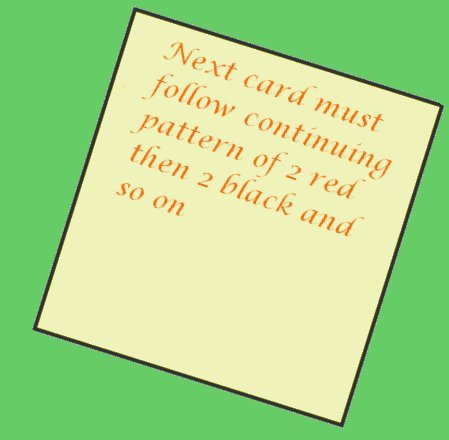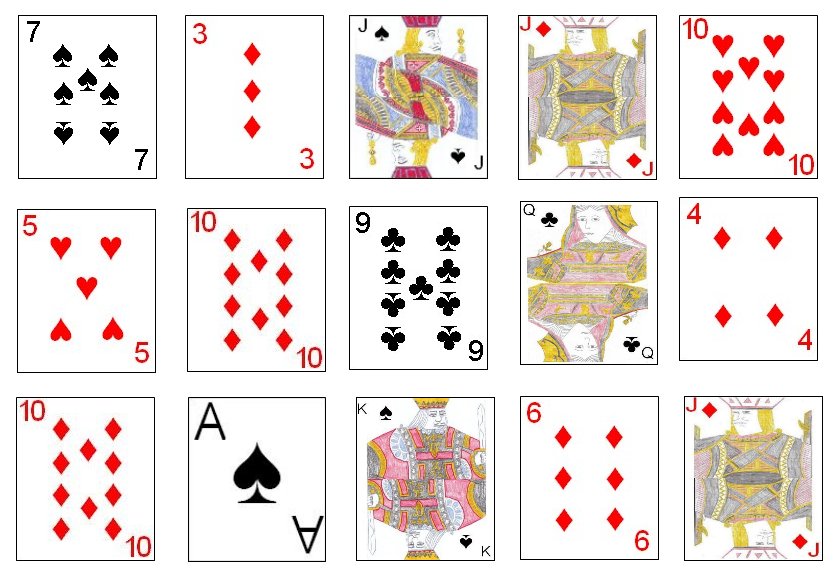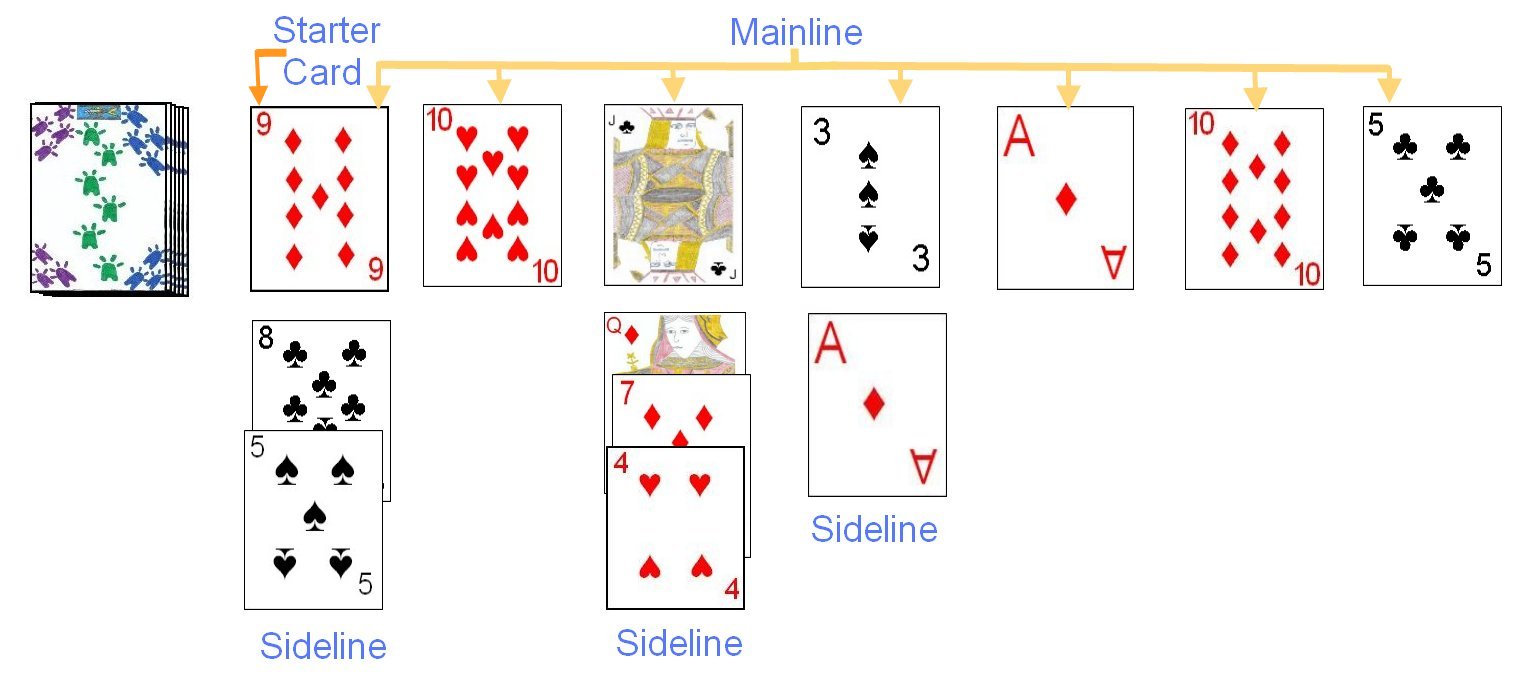 Eleusis Express is a very unique card game requiring the use of inductive reasoning by the participants in order to be victorious.
Eleusis Express was invented by Mathematics Professor John Golden, based on the game Eleusis originally created by Robert Abbott. In Eleusis Express players attempt to determine a secret rule that the dealer has created and is, at least at the start of the game, known only to him. Eleusis Express was originally designed to help elementary school teachers exhibit the scientific method, but, aside from the games obvious potential in this regard, it makes an enjoyable and challenging game for any card player.
Eleusis Express is a very unique card game requiring the use of inductive reasoning by the participants in order to be victorious.
Eleusis Express was invented by Mathematics Professor John Golden, based on the game Eleusis originally created by Robert Abbott. In Eleusis Express players attempt to determine a secret rule that the dealer has created and is, at least at the start of the game, known only to him. Eleusis Express was originally designed to help elementary school teachers exhibit the scientific method, but, aside from the games obvious potential in this regard, it makes an enjoyable and challenging game for any card player.
To begin the game, the dealer devises a secret rule and writes this rule down on a piece of paper where no player but himself can see the rule. This secret rule can be almost anything, but a few general principles should be followed when creating the rule:
- The rule should not rely on any outside factors except the sequence of cards. In other words the rule should not be dependent on the how the card is tilted, which player played the last card in the sequence or conditions of a similar nature.
- The rule should at some point, encompass every card in the deck. In other words, at some point in the sequence there should be an opportunity for every card in the deck to be played. Every play should have a next card which can be logically played next in the sequence, with no cards or condition which would terminate the sequence.
- Rules should not use wild cards or include individual exceptions or specific prohibition clauses on plays (i.e. all rules should be based purely on the current sequence and cards and nothing external to it).
- When the rule involves the numerical values of cards, the court cards would normally be considered to have the following denominations in that respect: Ace = 1; Jack = 11; Queen = 12 and King = 13. All other cards would have the same numerical rank as marked on the card.
- A rule should not be overly strict allowing only a very limited number of cards to be played. Similarly, the rule should not be so lenient that almost any card could be played as the next card in the sequence. Ideally, the rule should allow any of around 12 to 15 specific cards from one standard deck to be played at any time.
- Most players find that the secret rule often ends up being more difficult than the dealer had originally intended when creating the rule.
The dealer deals each player 12 face down cards around the table in a clockwise direction, excluding himself. The dealer then turns over the next card from the remaining stock and places it next to the stock. This is the starter card beginning the sequence of cards called the mainline. The player to the dealer's immediate left has the first turn with the play rotating in a clockwise direction from player to player, skipping the dealer. The object of the game is for the players to determine the dealers secret rule by play of the cards. The first player to completely run out of cards or correctly state the secret rule is the winner of the hand.
|
On his turn a player plays one card from his hand to the table in an attempt to extend the current card sequence of cards by playing a card which could legally be played next for that sequence (based on the secret rule). The dealer, after seeing the play will then indicate whether this is a legal or illegal play. If the play is legal, the card is set to the right of the last correct card in sequence extending the mainline. If this is the first correctly played card, it will go immediately to the right of the starter card. If, on the other hand, this card is not a valid next play on the sequence, the dealer places the card in a column under the last correctly played card on the layout (called a sideline) or the starter card. The player who places such an incorrect card must draw a replacement card from the stock, but a correct play requires no draw. If the play is correct, the player may also make an attempt to guess the dealers secret rule. This statement should be made in such a manner that all players can clearly hear the guess. If he guesses the secret rule correctly the hand ends with the player earning a number of bonus points for correctly deciphering the rule. If he guesses the rule incorrectly, the turn passes to the next player in rotation.
If a player believes he has no card in his hand he can legally play as the next card on the mainline sequence, he can also declare "No Play". If he does this, the player must expose his entire hand on the table so the dealer can verify if this is correct. If the player was correct and he had no legal play in his hand, and only has one card remaining in his hand, the round immediately ends with the players calculating their individual scores. If the player was correct but had more than one card remaining in their hand, the dealer places the players previous cards on the bottom of the stock and deals the player a new hand of cards containing one less than he previously had before declaring "No Play". If a player is wrong in his No Play statement, the dealer plays a legal card from the hand to the mainline. The player then regathers his hand and draws one card from the stock. Anytime a player correctly states he has no play on his turn, he may also attempt to guess the secret rule. If correct, the game immediately ends and the players tally their scores.
In addition, if a player is able to correctly play his last card to the mainline sequence, the game immediately ends with the player's scores then calculated.
Secret Rule Examples: There is an almost endless variety of secret rules the dealer can create, varying from the very difficult to the very simple. The following are just a few examples of a secret rule that might be used:

|
| A sampling of several mainlines representing secret rules that might be used while playing Eleusis Express. Can you figure out the secret rule represented by each of these sequences? |
- Alternate between one red card and one black card, repeating the sequence.
- Specific suit sequence. Any Spade (♠) then any Heart (♥) then any Club (♣) then any Diamond (♦). The sequence will continue to repeat in this manner.
- If the current displayed card is a card of an even number, play an odd numbered card and if the current card is of an odd number play an even numbered card.
- Card must be of the same suit or numerical rank as the last card on the Mainline.
- If the current displayed card is a card of an even number, play an odd numbered card and if the current card is of an odd number play an even numbered card.
- If the current displayed card is a card of an even number, play any red card, if the current card is of an odd number play a black card.
- If the current displayed card is a low card (Ace through 7) play a high card (8 to King). If the current card is high, play a low card.
- The next card to be played should be one number higher, one number lower or equal to the current card.
Hands End and Scoring: Once the hand ends, a player's score is computed. In addition, if the last card of the stock is drawn the game ends and scores computed for the hand. Each player's score is computed as follows:
A player is given a base score of 12 points upon which he must subtract one point for every card remaining in his hand. A player also gets bonus points for correctly guessing the rule or having completely depleted their hand of cards.
- A player correctly guessing the rule earns 6 bonus points.
- A player completely running out of cards earns 3 bonus points.
Optional Rules
There are sometimes a few rule differences that are encountered when playing Eleusis Express. These include the following:
Ten Card Hands: Some players prefer to use ten card hands instead of twelve card hands. This rule should not overly affect the game, but the base score for each player should be adjusted from 12 to 10 for each hand.
Incorrect Guess Penalty: When using this rule, a player who attempts to guess the secret rule and guesses incorrectly must draw one card from the stock.
Stock Depletion: In this version, when the stock is depleted, another standard 52 card deck is shuffled and set as the stock to allow play to continue.
Determination of Dealer: In some games, a player who correctly guesses the rule or runs out of cards becomes the dealer for the next hand (and creating their own secret rule). If the game ends with no player having run out of cards or correctly guessing the rule, the player with the highest score (not including the current dealer) on the hand becomes the dealer for the next hand.
Buying a Hint: Sometimes, when the players are having difficulty guessing the secret rule, the dealer may allow players to buy a hint. On his turn, but before playing, a player may buy a hint. He would draw a one card penalty from the deck in exchange for the dealer providing a hint for all players. The player buying the hint would then take his turn as normal. At other times, if the dealer determines that the players are having difficulty determining the secret rule, he may also provide a hint. He should do this at a point in the game where all players have had an equal number of turns during the hand.
Copyright © 2015 CatsAtCards.com. All rights reserved.
